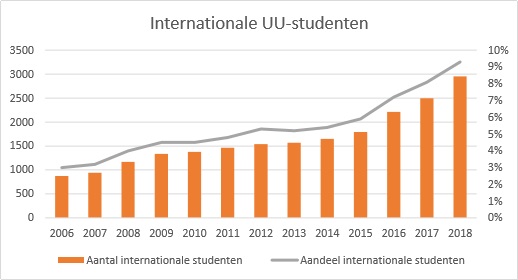UU least international university of the Netherlands
Once again, the number of international students in Dutch higher education has grown. Exactly 85,955 internationals from 170 countries are doing a full study programme this academic year. That’s 11.5 percent of all students, says internationalisation organisation Nuffic, based on the final registration data. Last year, the share of internationals was 10.5 percent.
Italians catching up with Chinese
Most internationals are from Germany (22,584). The Italians (4,814), however, are finding their way to Dutch universities more and more often. This year, they’ve overtaken the Chinese (4,547), ranking second.
Nuffic spokesperson Anne Lutgerink says Italians are more studying abroad more often anyway. “That’s partially due to the bad economy in Italy.” On the other hand, the number of Chinese students in the western world has stopped growing in the past few years. Nuffic says the Chinese government is investing more in its own education, and students are more likely to choose study programmes elsewhere in Asia. There are also simply fewer Chinese students: China’s one-child policy has led to a decrease of the total number of Chinese high school students.
9.3 percent of UU students are international
The university with the most internationals by far, both in absolute numbers and in percentages, is still Maastricht University. Nuffic says it’s remarkable that more and more international students are studying at Leiden University, Erasmus University Rotterdam, University of Groningen, and University of Amsterdam. Ten years ago, no more than 10 percent of their students came from another country. Things are rather different now: the percentage of international students at the University of Groningen is 22.4, and at the University of Amsterdam and Erasmus University Rotterdam, it’s around 20 percent.
The universities of technology in Delft, Twenty, Eindhoven, and Wageningen also draw quite a number of international students, who mainly choose these schools for their Master’s degrees of PhD programmes. In Twente, the percentage of internationals grew the most: from 21.3 percent in 2016-2017 to 26.8 percent this academic year. The total number of international students at the universities of technology has quadrupled in the past ten years.
| Share | Number | |
| Universiteit Maastricht | 53,7% | 9.227 |
| Universiteit van Twente | 26,8% | 2.860 |
| Rijksuniversiteit Groningen | 22,4% | 6.969 |
| TU Delft | 21,7% | 5.324 |
| Wageningen Universiteit | 20,8% | 2.481 |
| Universiteit van Amsterdam | 20,6% | 7.016 |
| Erasmus Universiteit Rotterdam | 19,8% | 5.329 |
| Tilburg University | 15,5% | 2.446 |
| Universiteit Leiden | 15,3% | 4.439 |
| TU Eindhoven | 13,3% | 1.588 |
| Vrije Universiteit Amsterdam | 12,0% | 2.952 |
| Radboud Universiteit Nijmegen | 11,0% | 2.384 |
| Universiteit Utrecht | 9,3% | 2.954 |
Number of international UU students more than doubled
Utrecht University is the least international university of the Netherlands. With 9.3 percent international students, the overall share of internationals is lowest at the UU. However, it’s still an increase compared to last year, when 8.1 percent of UU students came from another country.
Additionally, the total number of international students at the UU has more than doubled in the past ten years. Nuffic data shows that especially the UU Master’s programmes draw many internationals. There are three thousand international UU students, and two out of every three of them are doing a Master’s programme.
Foreign students at Dutch universities most often choose a programme in social sciences (12,370). Especially Psychology, with 6,786 registered international students, was popular – even if the share of international students studying at a university college is the highest.
International students at Utrecht University:
| Aantal | Aandeel | |
| Social Sciences | 12.370 | 23,9% |
| Economics and business | 12.169 | 26,8% |
| Engineering | 8.644 | 19,8% |
| Art and Culture | 5.689 | 18,2% |
| Science | 4.745 | 15,0% |
| University college | 4.170 | 36,9% |
| Law | 3.308 | 11,2% |
| Health | 2.583 | 7,5% |
| Agriculture and Environment | 2.424 | 20,6% |
| Education | 67 | 4,2% |